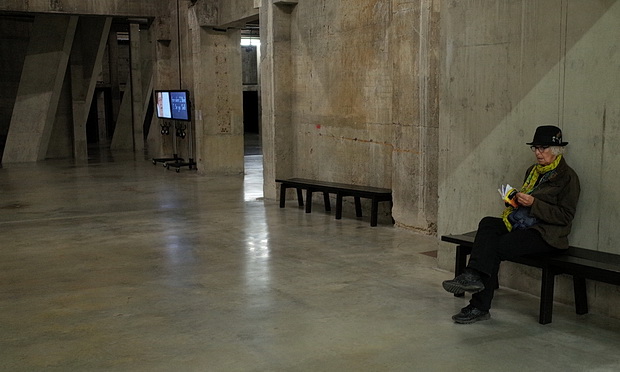
It’s been a while since I’d been along to the Tate Modern, and a lot has changed since my last visit, with the new Switch House extension being built and the conversion of three circular underground tanks into new galleries.
Built above the oil tanks is the new Switch House extension, a ten-storey, 65-metre high tower, which opened to the public on 17 June 2016.
The extension offers 22,492 square metres of additional gross internal area for display and exhibition spaces, performance spaces, education facilities, offices, catering and retail facilities as well as a car parking and a new external public space.
The Turbine Hall resonated to Bruce Nauman’s ‘Raw Materials’ audio installation.
The three large, circular, underground oil tanks originally used by the power station have been converted into accessible display spaces and facilities areas.
Two of the Tanks are used to show live performance art and installations while the third provides utility space. Tate describes them as “the world’s first museum galleries permanently dedicated to live art.”
An austere sweeping concrete staircase complements the roughly finished tank walls.
This installation by Susan Hiller called ‘Monument‘ incorporates forty-one photographs of memorial plaques from Postman’s Park, near St Paul’s Cathedral, London,
Each plaque commemorates an ordinary man, woman or child who died while performing an act of heroism. One memorial reads, for example:
Elizabeth Boxall. Aged 17 of Bethnal Green. Who Died of Injuries Received In Trying to Save A Child/From a Runaway Horse, June 20 1888
Inside one of the tanks.
‘In Wetin You Go Do?‘ by Nigerian artist Otobong Nkanga integrates voice and sculpture to ‘reflect on contemporary anxieties.’
The installation consists of concrete spheres connected to each other with heavy ropes. Sound can be heard from three of the balls, carefully edited and layered, with each sphere representing a different imaginary character.
These soundtracks are part narrative and part song, and shift between stream of consciousness and profound statements in English, French and Nigerian Pidgin, an English-based Creole language widely spoken across Nigeria. In a dialogue improvised by the artist, the characters reflect on life’s difficulties, asking ‘Wetin you go do?’, a colloquial term in Nigerian Pidgin meaning ‘What are you going to do?’
The spheres are arranged in small groupings that mimic the way people gather in a crowd. The ropes connecting the spheres suggest networks within society. As such, the work can be read as a metaphor for the interconnectedness of life. With some of the concrete balls weighing more than 600 kilograms the work might also signal the impossibility of moving forward alone.
Steps to nowhere.
The star of the show for me was Janet Cardiff’s Part Motet 2001, an audio installation reworking the sixteenth-century choral work Spem in Alium by English composer Thomas Talli.
Janet Cardiff worked with the Salisbury Cathedral Choir to record 40 individual singers, playing each voice through its own corresponding speaker.
The speakers are carefully positioned in eight different groups of five, responding to the structure of Tallis’s complex vocal piece, or motet. Each group forms a choir of five singers with different vocal ranges: a bass, baritone, tenor, alto and soprano.
The eight choirs produce harmonies which blend into a polyphonic landscape of sound. Visitors are encouraged to walk among the speakers to hear the individual voices, as well as the immersive sound of the motet. Cardiff said: ‘I am interested in how sound may physically construct a space in a sculptural way and how a viewer may choose a path through this physical yet virtual space.’
Sung in Latin, the first line ‘Spem in alium nunquam habui …’ translates as ‘I have never put my hope in any other but in you, O God of Israel’. Although Tallis wrote his music for a Christian setting, Cardiff has shown her audio installation in a variety of spaces, both religious and secular. The artist is interested in the ways in which music can evoke different emotions.
Moving between the speakers and hearing the individual harmonies was a beautiful experience.
Stairways on the new extension.
Gubbins.
Some of the artworks on display in the new extension.
More info:
OPENING TIMES
Sunday to Thursday 10.00-18.00
Friday to Saturday 10.00-22.00
Bankside, London, SE1 9TG


